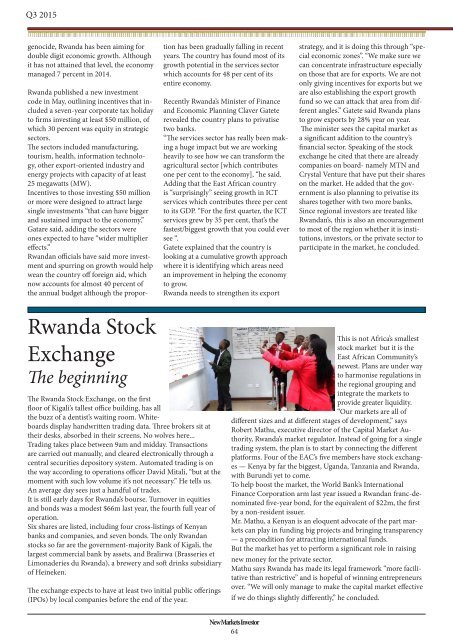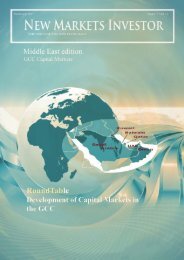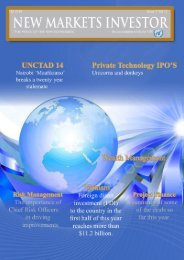New Markets Investor
Published by The Media Corporation
Published by The Media Corporation
Create successful ePaper yourself
Turn your PDF publications into a flip-book with our unique Google optimized e-Paper software.
Q3 2015genocide, Rwanda has been aiming fordouble digit economic growth. Althoughit has not attained that level, the economymanaged 7 percent in 2014.Rwanda published a new investmentcode in May, outlining incentives that includeda seven-year corporate tax holidayto firms investing at least $50 million, ofwhich 30 percent was equity in strategicsectors.The sectors included manufacturing,tourism, health, information technology,other export-oriented industry andenergy projects with capacity of at least25 megawatts (MW).Incentives to those investing $50 millionor more were designed to attract largesingle investments “that can have biggerand sustained impact to the economy,”Gatare said, adding the sectors wereones expected to have “wider multipliereffects.”Rwandan officials have said more investmentand spurring on growth would helpwean the country off foreign aid, whichnow accounts for almost 40 percent ofthe annual budget although the proportionhas been gradually falling in recentyears. The country has found most of itsgrowth potential in the services sectorwhich accounts for 48 per cent of itsentire economy.Recently Rwanda’s Minister of Financeand Economic Planning Claver Gateterevealed the country plans to privatisetwo banks.“The services sector has really been makinga huge impact but we are workingheavily to see how we can transform theagricultural sector [which contributesone per cent to the economy], “he said.Adding that the East African countryis “surprisingly” seeing growth in ICTservices which contributes three per centto its GDP. “For the first quarter, the ICTservices grew by 35 per cent, that’s thefastest/biggest growth that you could eversee “.Gatete explained that the country islooking at a cumulative growth approachwhere it is identifying which areas needan improvement in helping the economyto grow.Rwanda needs to strengthen its exportstrategy, and it is doing this through “specialeconomic zones”. “We make sure wecan concentrate infrastructure especiallyon those that are for exports. We are notonly giving incentives for exports but weare also establishing the export growthfund so we can attack that area from differentangles.” Gatete said Rwanda plansto grow exports by 28% year on year.The minister sees the capital market asa significant addition to the country’sfinancial sector. Speaking of the stockexchange he cited that there are alreadycompanies on board- namely MTN andCrystal Venture that have put their shareson the market. He added that the governmentis also planning to privatise itsshares together with two more banks.Since regional investors are treated likeRwandan’s, this is also an encouragementto most of the region whether it is institutions,investors, or the private sector toparticipate in the market, he concluded.Rwanda StockExchangeThe beginningThe Rwanda Stock Exchange, on the firstfloor of Kigali’s tallest office building, has allthe buzz of a dentist’s waiting room. Whiteboardsdisplay handwritten trading data. Three brokers sit attheir desks, absorbed in their screens. No wolves here...Trading takes place between 9am and midday. Transactionsare carried out manually, and cleared electronically through acentral securities depository system. Automated trading is onthe way according to operations officer David Mitali, “but at themoment with such low volume it’s not necessary.” He tells us.An average day sees just a handful of trades.It is still early days for Rwanda’s bourse. Turnover in equitiesand bonds was a modest $66m last year, the fourth full year ofoperation.Six shares are listed, including four cross-listings of Kenyanbanks and companies, and seven bonds. The only Rwandanstocks so far are the government-majority Bank of Kigali, thelargest commercial bank by assets, and Bralirwa (Brasseries etLimonaderies du Rwanda), a brewery and soft drinks subsidiaryof Heineken.The exchange expects to have at least two initial public offerings(IPOs) by local companies before the end of the year.This is not Africa’s smalleststock market but it is theEast African Community’snewest. Plans are under wayto harmonise regulations inthe regional grouping andintegrate the markets toprovide greater liquidity.“Our markets are all ofdifferent sizes and at different stages of development,” saysRobert Mathu, executive director of the Capital Market Authority,Rwanda’s market regulator. Instead of going for a singletrading system, the plan is to start by connecting the differentplatforms. Four of the EAC’s five members have stock exchanges— Kenya by far the biggest, Uganda, Tanzania and Rwanda,with Burundi yet to come.To help boost the market, the World Bank’s InternationalFinance Corporation arm last year issued a Rwandan franc-denominatedfive-year bond, for the equivalent of $22m, the firstby a non-resident issuer.Mr. Mathu, a Kenyan is an eloquent advocate of the part marketscan play in funding big projects and bringing transparency— a precondition for attracting international funds.But the market has yet to perform a significant role in raisingnew money for the private sector.Mathu says Rwanda has made its legal framework “more facilitativethan restrictive” and is hopeful of winning entrepreneursover. “We will only manage to make the capital market effectiveif we do things slightly differently,” he concluded.<strong>New</strong> <strong>Markets</strong> <strong>Investor</strong>64









